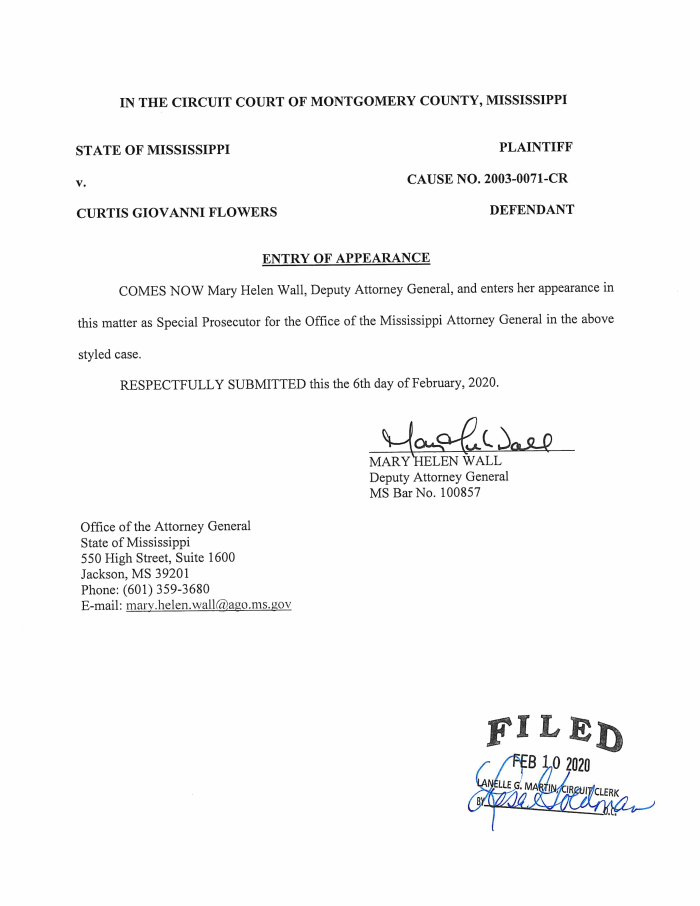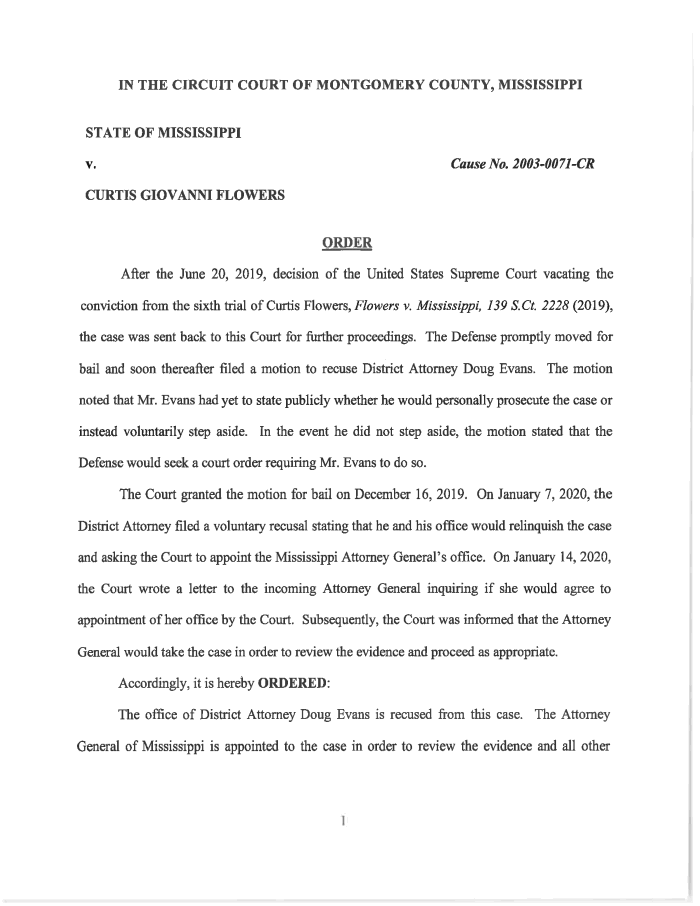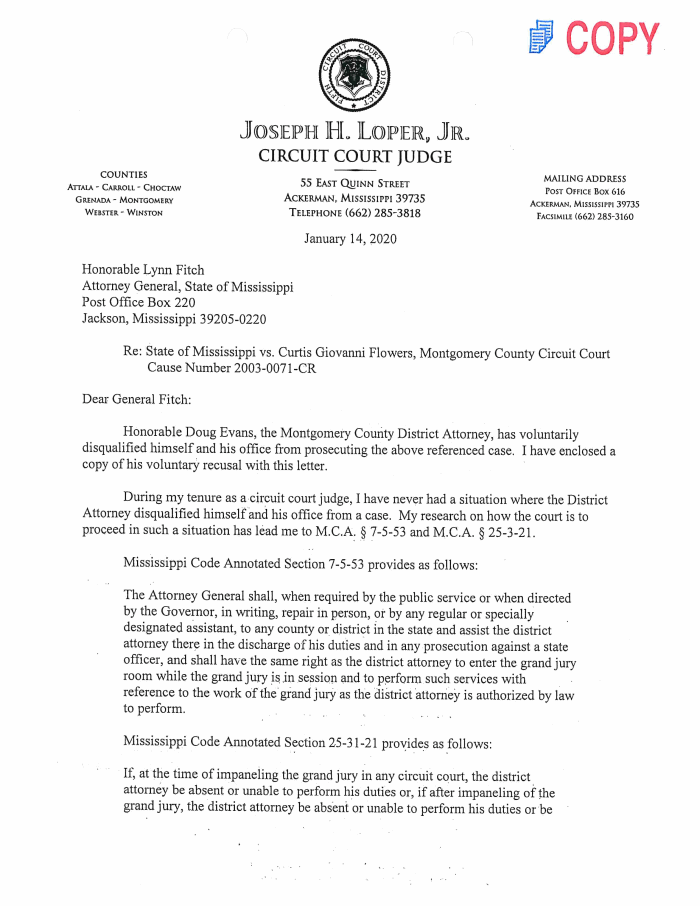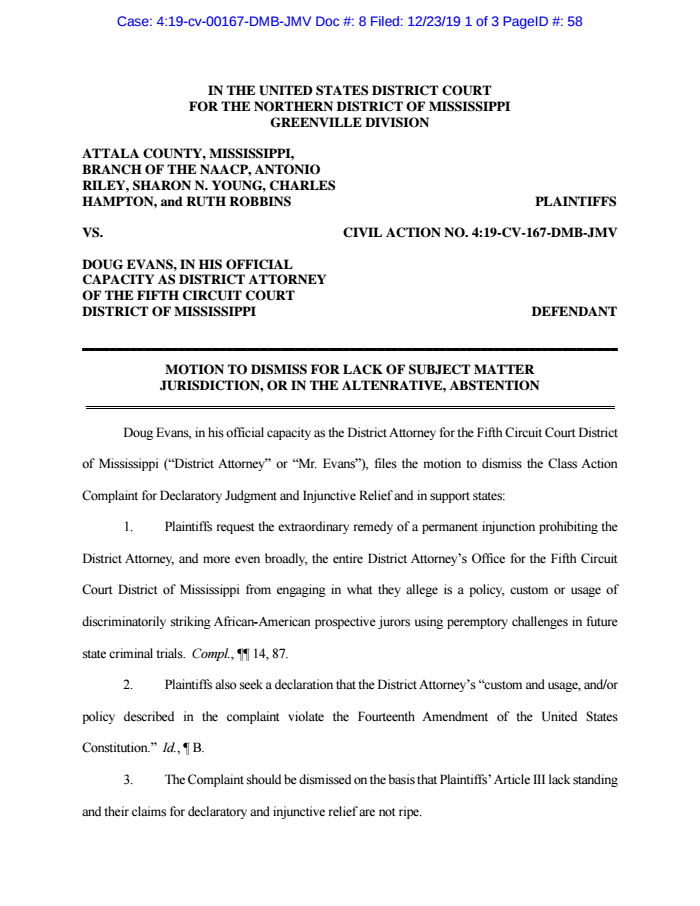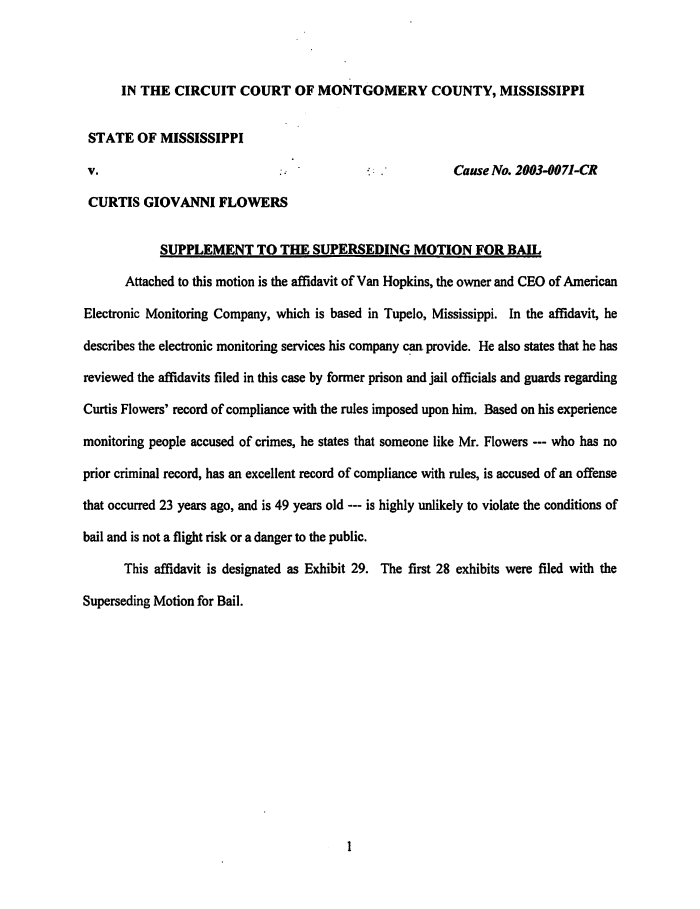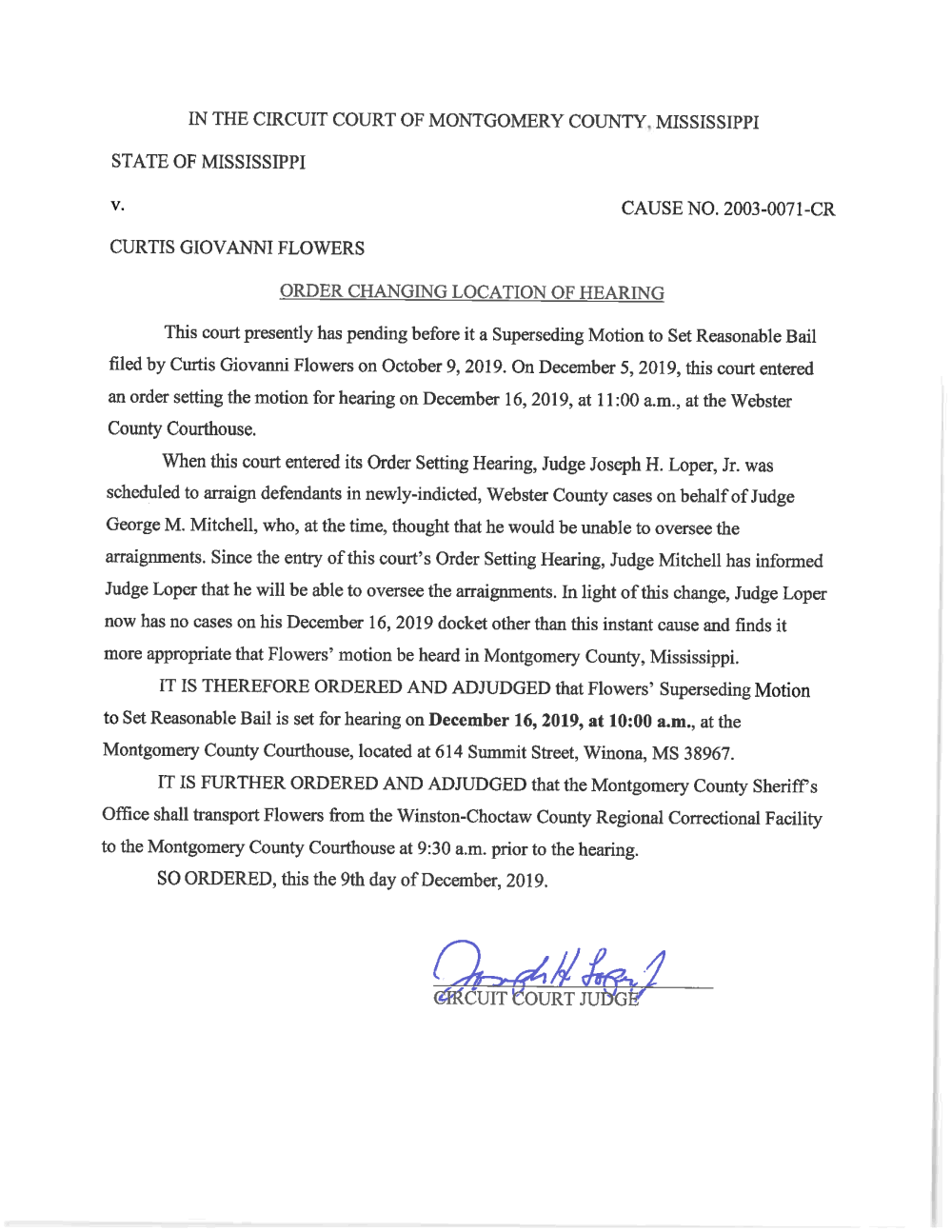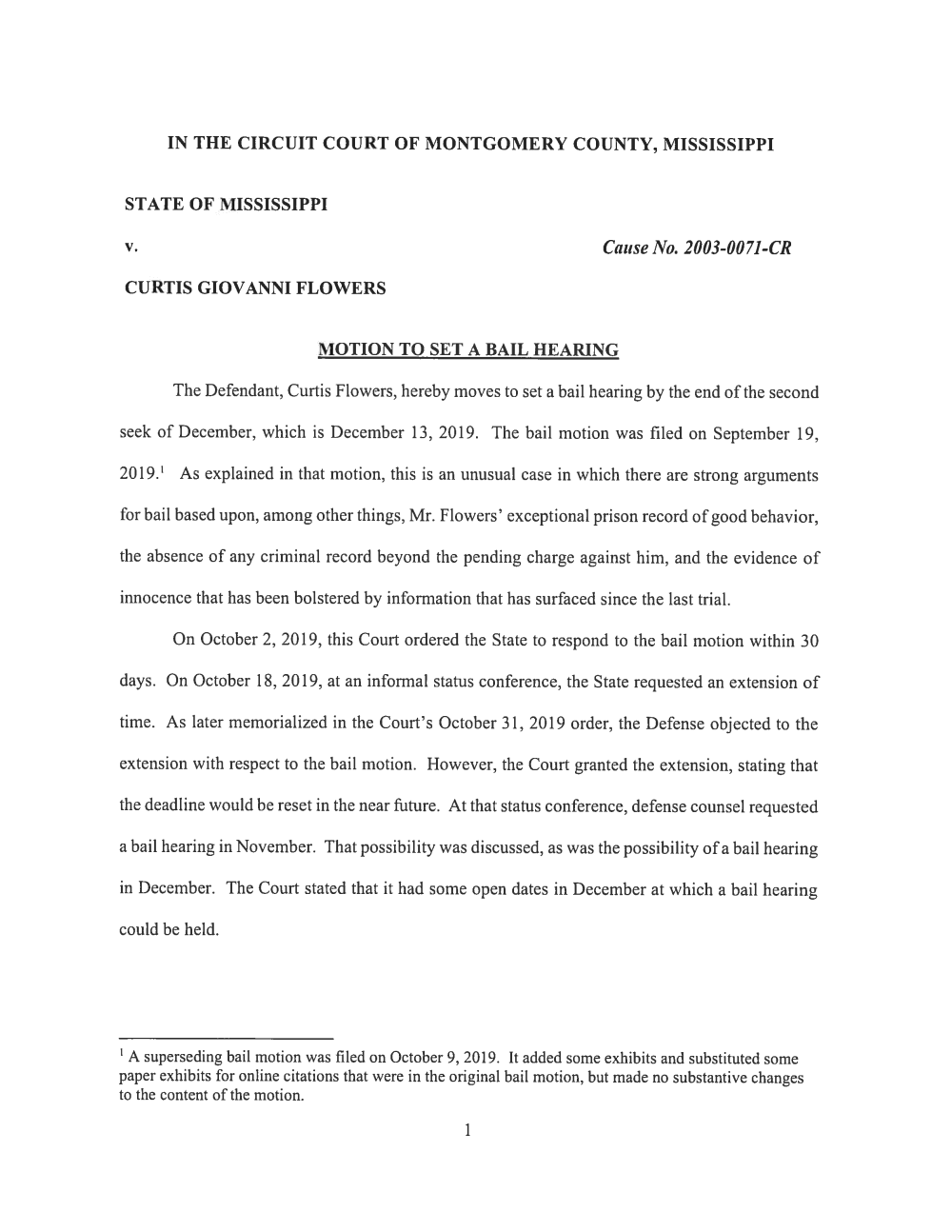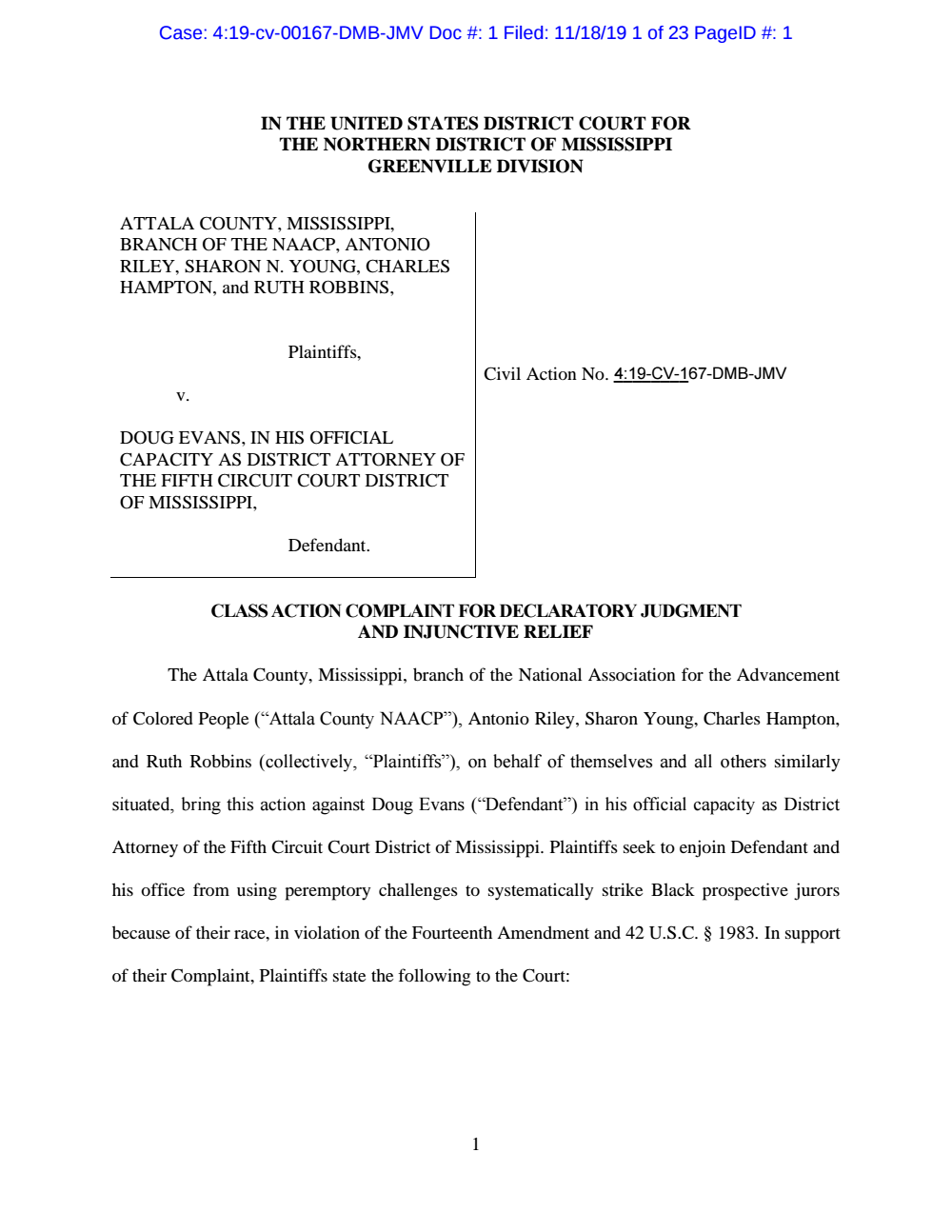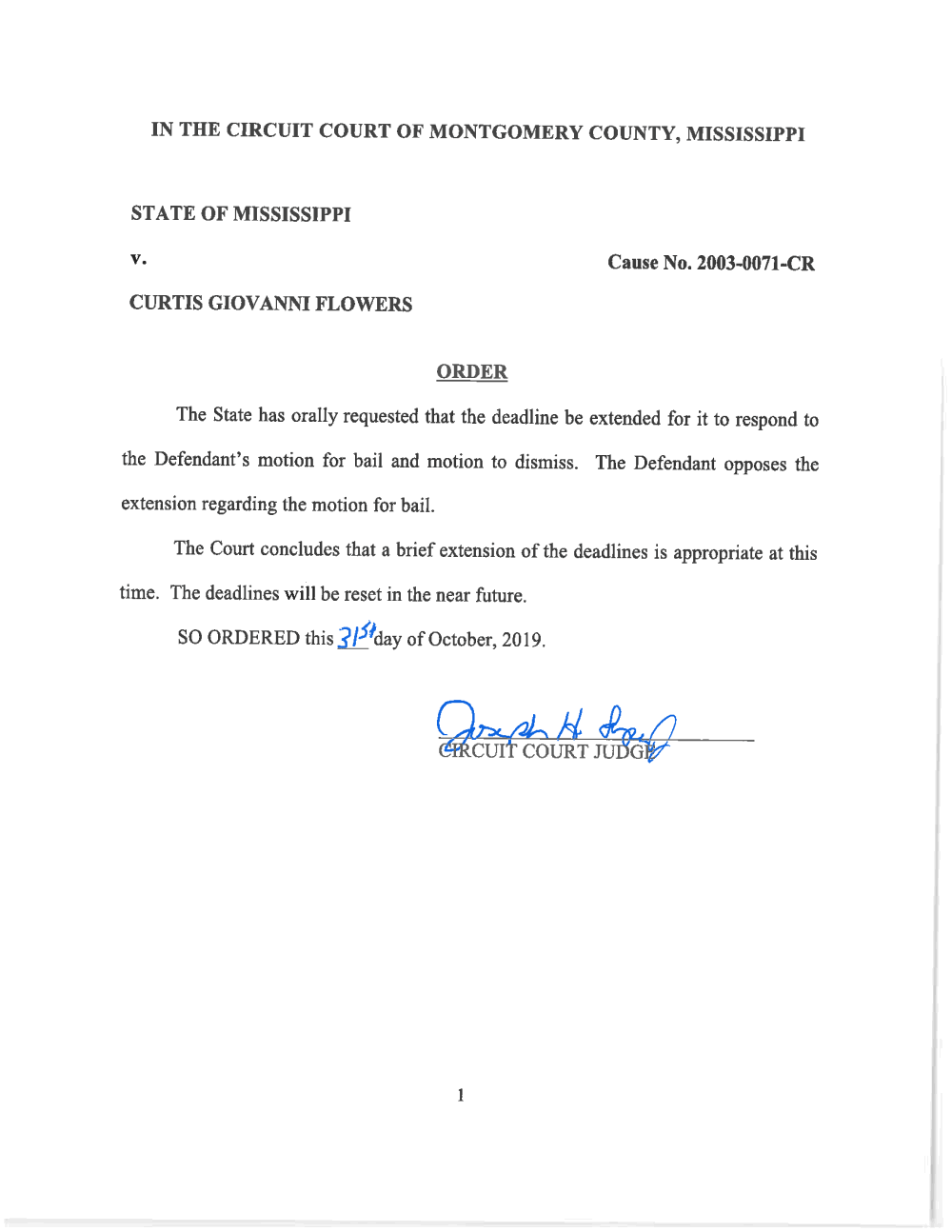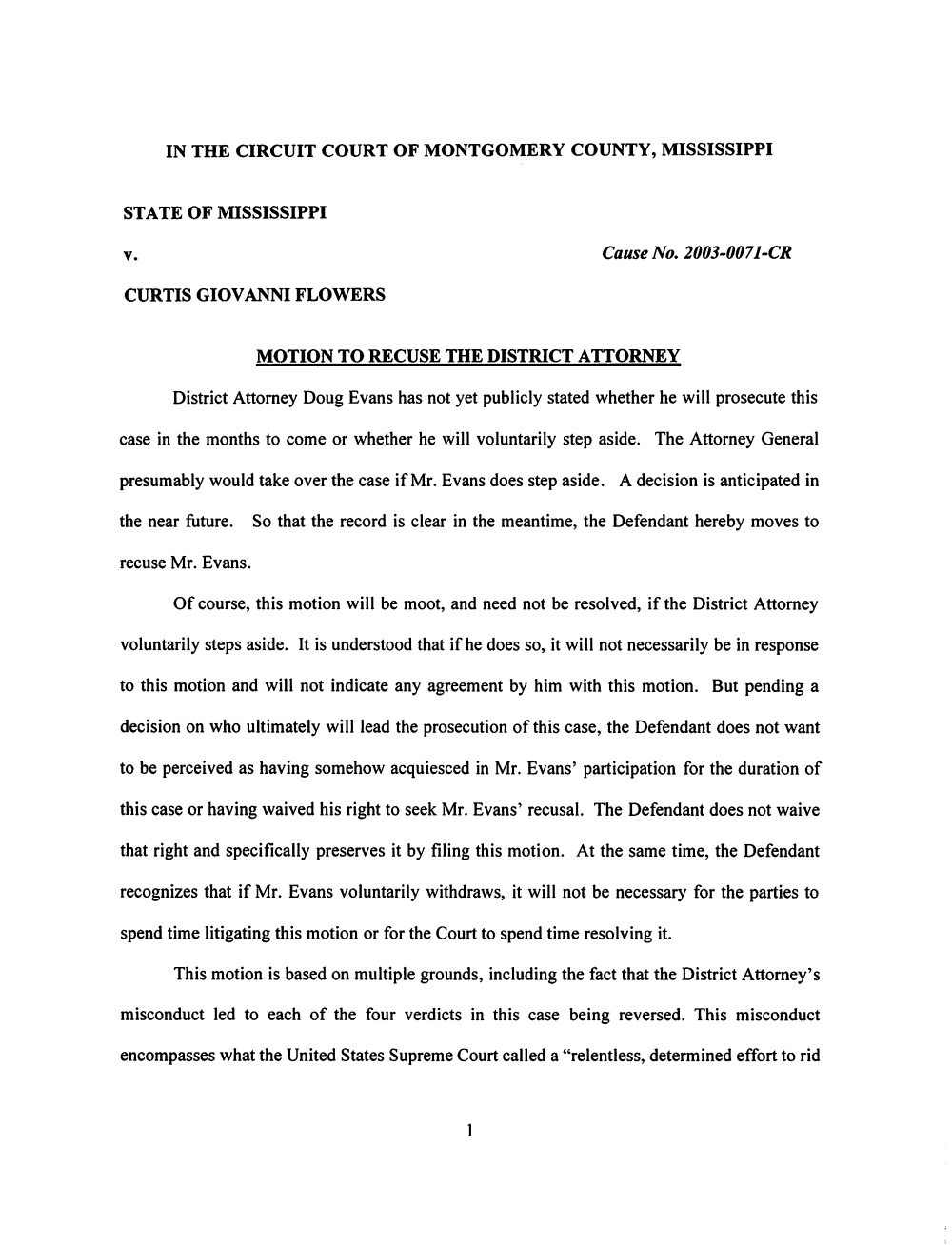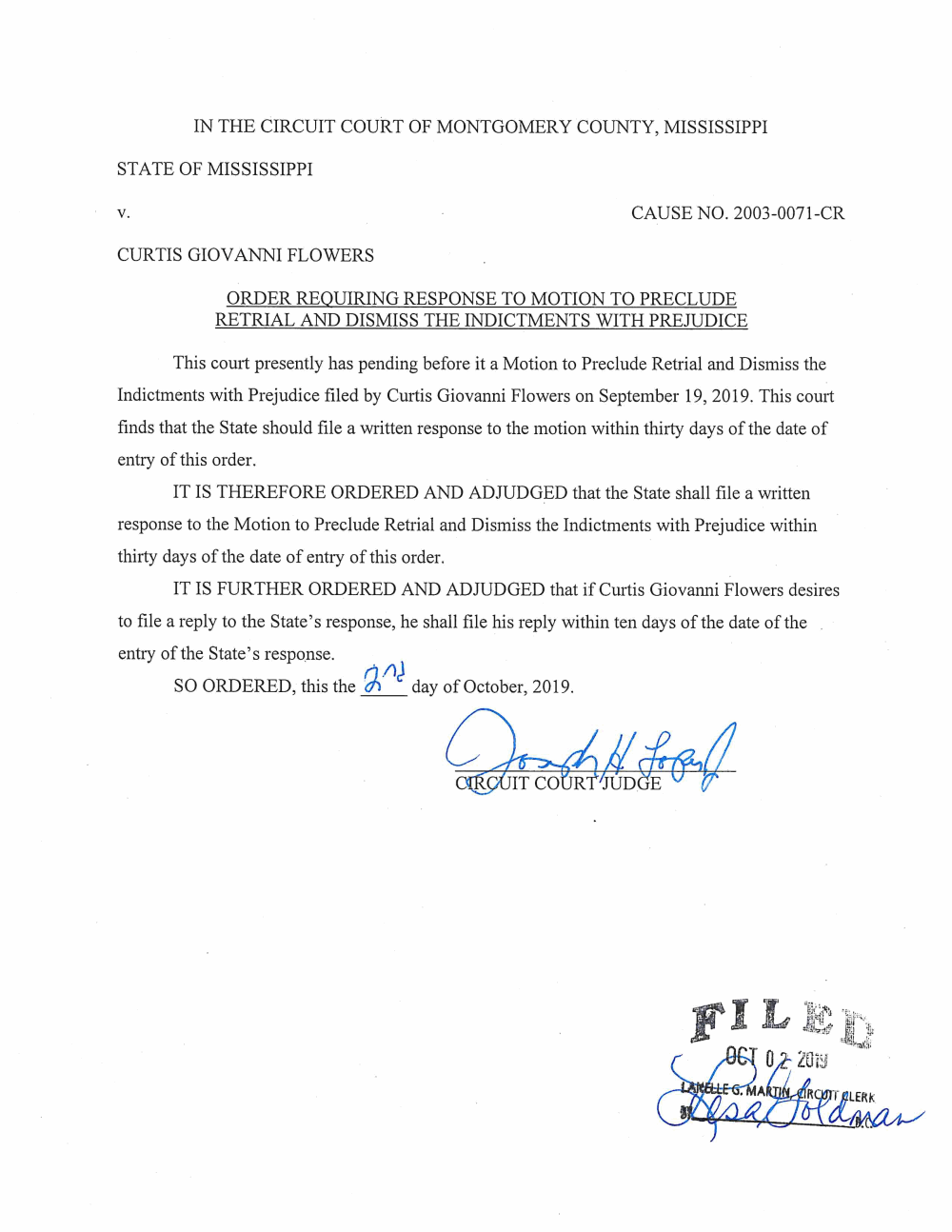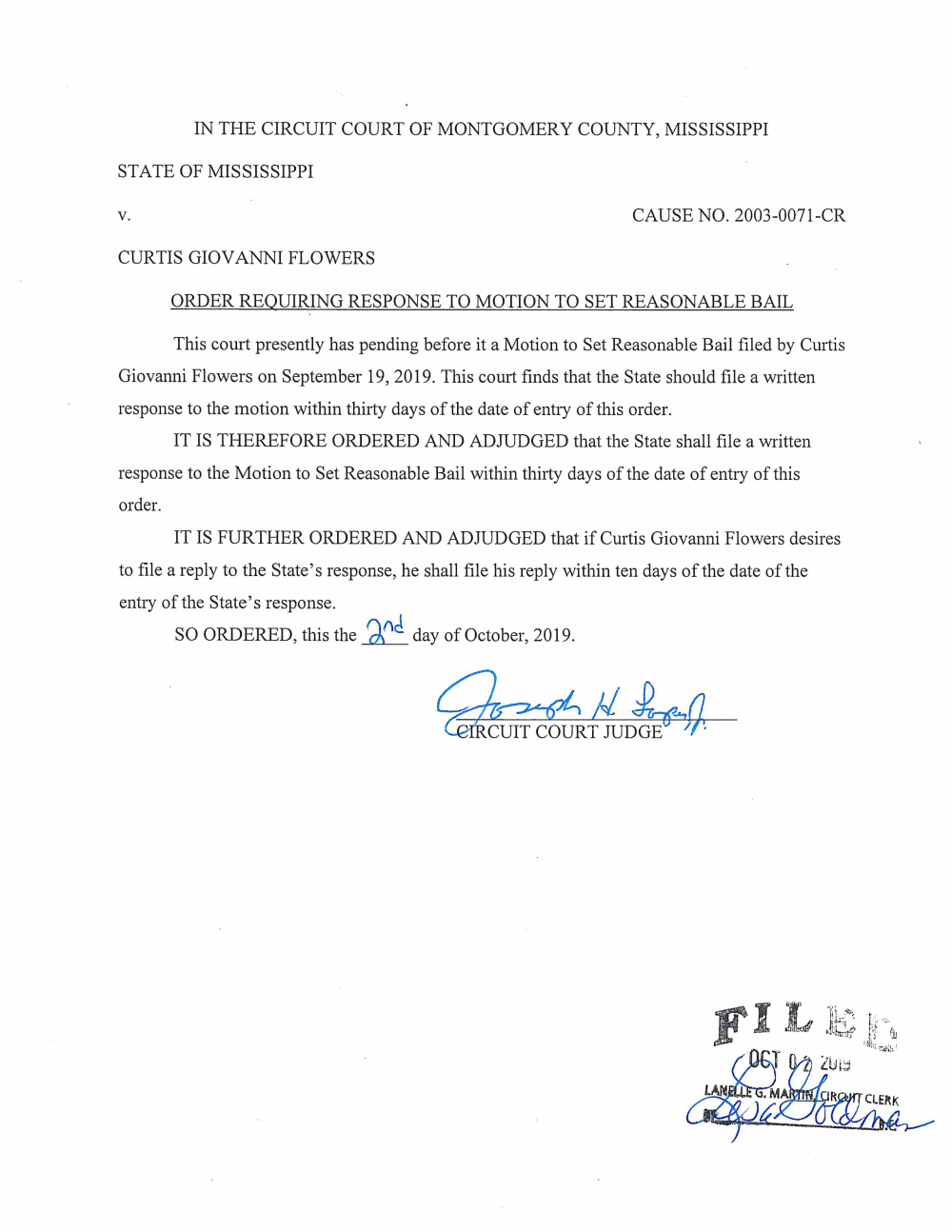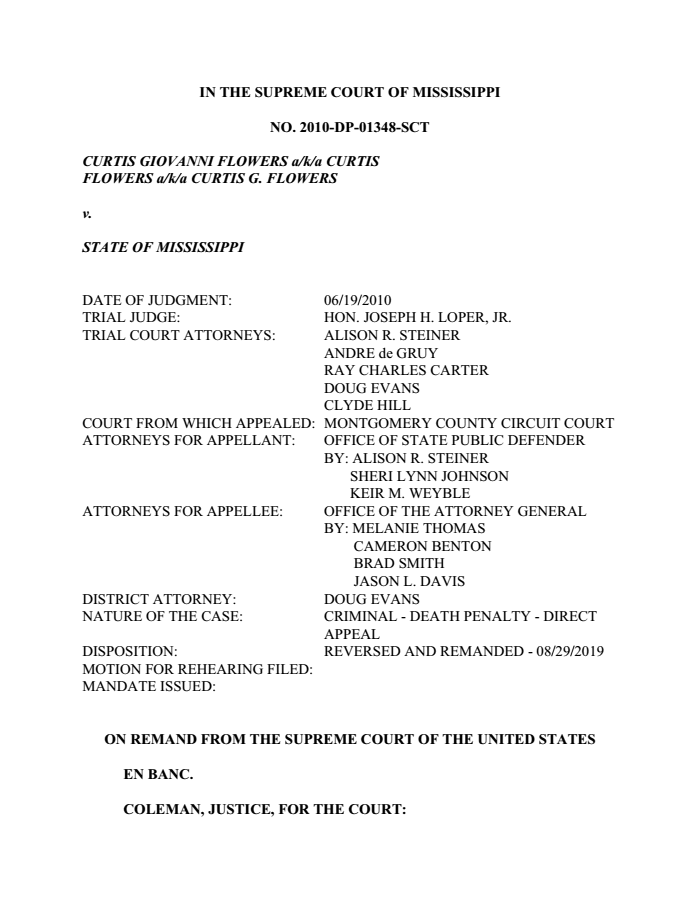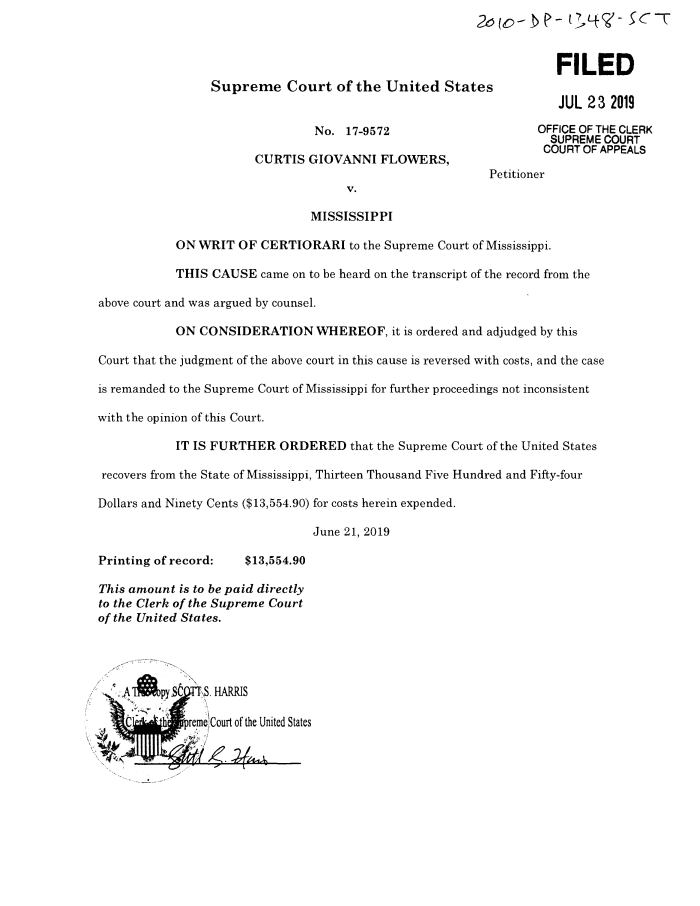The latest on the Curtis Flowers case
On Sept. 4, 2020, the Mississippi Attorney General dropped all charges against Curtis Flowers. With that, the criminal case of the State of Mississippi v. Curtis Flowers was brought to an end. After 23 years behind bars, six trials and four death sentences, Flowers is a free man.
Fifth Circuit Court of Appeals affirms dismissal of suit against Evans
Four of District Attorney Doug Evans' Black constituents and a central Mississippi branch of the NAACP lose their appeal in the federal civil rights lawsuit they filed against Evans in 2019. More.
Curtis Flowers sues District Attorney Doug Evans
The Mississippi man tried six times for the same crime alleges in a lawsuit that Evans and three investigators committed misconduct that led to his wrongful imprisonment for more than two decades. Read.
Mississippi to pay Curtis Flowers $500,000 for his decades behind bars
Under the judgment — which the Mississippi Attorney General's Office didn't oppose — the state will pay Flowers $50,000 a year for the next 10 years. The award is the maximum allowed under Mississippi law. Read.
Charges against Curtis Flowers are dropped
Mississippi Attorney General Lynn Fitch files a motion to dismiss the capital murder indictments pending against Flowers. Shortly thereafter, Judge Joey Loper signs an order granting the motion. The charges against Flowers are dismissed with prejudice, meaning that Flowers can never be tried again for the murders at Tardy Furniture. The move brings the State of Mississippi v. Curtis Flowers to a decisive close. Read.
Judge dismisses civil rights lawsuit against DA Doug Evans
U.S. District Judge Debra Brown throws out a federal civil rights lawsuit over Evans' jury selection practices on procedural grounds. In her order, Brown acknowledges that the plaintiffs' claim that Evans has a "policy, custom, and usage of racially discriminatory jury selection" "seems to be true," but she rules that federal courts shouldn't interfere in state criminal court proceedings. The plaintiffs — four of Evans' Black constituents and a central Mississippi branch of the NAACP — have 30 days to appeal. Read.
Court hearing in lawsuit over Evans' jury selection practices
At a hearing, U.S. District Judge Debra Brown presses a lawyer for the plaintiffs — four of District Attorney Doug Evans' Black constituents and a central Mississippi branch of the NAACP — about how he'd have federal courts enforce an order barring Evans from striking Black jurors because of their race, should the judge issue such an order.
The lawsuit, filed in November, used In the Dark's finding that District Attorney Doug Evans and his assistants, over 26 years, struck Black prospective jurors at nearly 4.5 times the rate they struck white ones, to argue that Evans has a "policy, custom, and usage of racially discriminatory jury selection." The suit asks the federal court "to end this odious practice" by issuing an injunction ordering Evans to stop excluding Black people from juries at disproportionately high rates.
The hearing, conducted over video conference, was in response to Evans' motion to have the lawsuit dismissed. Evans' lawyer, whose client wasn't present, had argued in the motion that the injunction would constitute an "ongoing and deeply fact-intensive 'federal audit of state criminal proceedings.'"
Most of the judge's questions focused on a related legal doctrine called abstention, which allows federal courts to refrain from intervening in state court proceedings in certain circumstances. Judge Brown directed the majority of her questions to the plaintiffs' lawyer, Chris Kemmitt of the NAACP Legal Defense Fund. She sought assurances that the monitoring he was requesting wouldn't disrupt criminal trials and appeals in which the prospective jurors he was trying to protect weren't even parties.
Kemmitt argued that the impact of federal oversight on court proceedings would be minimal, that struck Black jurors had no other way of vindicating their civil rights and that Evans wouldn't be held accountable otherwise. "I don't think that Mr. Evans is going to turn over a new leaf ... unless this court orders him to do so," Kemmitt said.
The lawsuit, filed in November, used In the Dark's finding that District Attorney Doug Evans and his assistants, over 26 years, struck Black prospective jurors at nearly 4.5 times the rate they struck white ones, to argue that Evans has a "policy, custom, and usage of racially discriminatory jury selection." The suit asks the federal court "to end this odious practice" by issuing an injunction ordering Evans to stop excluding Black people from juries at disproportionately high rates.
The hearing, conducted over video conference, was in response to Evans' motion to have the lawsuit dismissed. Evans' lawyer, whose client wasn't present, had argued in the motion that the injunction would constitute an "ongoing and deeply fact-intensive 'federal audit of state criminal proceedings.'"
Most of the judge's questions focused on a related legal doctrine called abstention, which allows federal courts to refrain from intervening in state court proceedings in certain circumstances. Judge Brown directed the majority of her questions to the plaintiffs' lawyer, Chris Kemmitt of the NAACP Legal Defense Fund. She sought assurances that the monitoring he was requesting wouldn't disrupt criminal trials and appeals in which the prospective jurors he was trying to protect weren't even parties.
Kemmitt argued that the impact of federal oversight on court proceedings would be minimal, that struck Black jurors had no other way of vindicating their civil rights and that Evans wouldn't be held accountable otherwise. "I don't think that Mr. Evans is going to turn over a new leaf ... unless this court orders him to do so," Kemmitt said.
Mary Helen Wall named prosecutor in Flowers case
Deputy Attorney General Mary Helen Wall is the new prosecutor in the Curtis Flowers case, according to a court filing Monday. Wall has spent more than 16 years in criminal litigation, as both a federal prosecutor and as a public defender in Jackson, Mississippi. She is a fresh face at the Mississippi attorney general's office, now led by Lynn Fitch, a Republican who was elected in November.
Ray Coleman, a spokesman for the attorney general, described Monday's filing — a one-sentence long "entry of appearance" — as a procedural step, and said Flowers' fate is still up to the attorney general herself.
"Deputy Attorney General Wall is the prosecutor of record for the State, but Attorney General Fitch will make any final decisions regarding Mr. Flowers' case," Coleman said by email. "As stated in Judge Loper's appointment order, there is no timeline for a decision on the next steps, based on the nature of the case and the amount of evidence. This will allow General Fitch and her team to conduct a thorough review of all evidence before deciding the next steps."
In September, Flowers filed a motion asking for the charges against him to be dismissed. The state has yet to respond. Read.
Ray Coleman, a spokesman for the attorney general, described Monday's filing — a one-sentence long "entry of appearance" — as a procedural step, and said Flowers' fate is still up to the attorney general herself.
"Deputy Attorney General Wall is the prosecutor of record for the State, but Attorney General Fitch will make any final decisions regarding Mr. Flowers' case," Coleman said by email. "As stated in Judge Loper's appointment order, there is no timeline for a decision on the next steps, based on the nature of the case and the amount of evidence. This will allow General Fitch and her team to conduct a thorough review of all evidence before deciding the next steps."
In September, Flowers filed a motion asking for the charges against him to be dismissed. The state has yet to respond. Read.
Attorney General agrees to take Flowers case
In an order, Judge Joey Loper reveals that the Mississippi attorney general's office has agreed to take over the Curtis Flowers case. Loper's order makes official the removal of District Attorney Doug Evans, who had asked to be recused from the case in January. In his order, Loper instructs Evans to send "his complete file" on the case to the attorney general's office by the end of the month so the new prosecutors can "review the evidence and all other relevant matters and proceed as appropriate." Loper sets no immediate deadlines for the recently inaugurated Attorney General Lynn Fitch, noting that "it will take some time for [her] to review the case." Read.
Prosecution witness Patricia Hallmon dies

Patricia Hallmon, who testified in all six of Curtis Flowers' trials, died on Saturday*, according to Affordable Funeral Home in Grenada, Mississippi. She was 50.
Hallmon was the sister of triple-murderer Odell Hallmon, also a witness in the Flowers case. Patricia testified for the state that she saw Flowers — then her next-door neighbor — coming and going from his house on the morning of the murders. In 1996, she had told investigators that Flowers had been "in a rage" that morning and that, several days earlier, she'd overheard him speak angrily about what she assumed was his job at Tardy Furniture. However, when she spoke with In The Dark in 2017, she contradicted her previous statement, telling reporters that she'd never heard Flowers say anything negative about Tardy Furniture or his co-workers there. "He ain't act like no violent person," Hallmon told In The Dark. "He acted like the sweetest gentleman."
Hallmon isn't the first witness to die in the 23-year-long history of the case, but she is the only witness to have recanted parts of her testimony to In The Dark before doing so. Should the case proceed to a seventh trial, there is likely to be debate over whether Hallmon's testimony should be treated in the same way as that of other dead witnesses — like Porky Collins and Sam Jones — whose earlier testimonies have been read into open court at subsequent trials.
Hallmon was the sister of triple-murderer Odell Hallmon, also a witness in the Flowers case. Patricia testified for the state that she saw Flowers — then her next-door neighbor — coming and going from his house on the morning of the murders. In 1996, she had told investigators that Flowers had been "in a rage" that morning and that, several days earlier, she'd overheard him speak angrily about what she assumed was his job at Tardy Furniture. However, when she spoke with In The Dark in 2017, she contradicted her previous statement, telling reporters that she'd never heard Flowers say anything negative about Tardy Furniture or his co-workers there. "He ain't act like no violent person," Hallmon told In The Dark. "He acted like the sweetest gentleman."
Hallmon isn't the first witness to die in the 23-year-long history of the case, but she is the only witness to have recanted parts of her testimony to In The Dark before doing so. Should the case proceed to a seventh trial, there is likely to be debate over whether Hallmon's testimony should be treated in the same way as that of other dead witnesses — like Porky Collins and Sam Jones — whose earlier testimonies have been read into open court at subsequent trials.
*The original version of this story incorrectly reported the day of Hallmon's death.
Judge Joey Loper asks new attorney general to take Flowers case
Judge Loper, who has yet to respond to District Attorney Doug Evans' move to recuse himself from the Flowers case, sends a letter to newly inaugurated Mississippi Attorney General Lynn Fitch to ask for her guidance. "During my tenure as a circuit court judge," he writes, "I have never had a situation where the District Attorney disqualified himself and his office from a case." Loper asks Fitch if he can appoint her office to take over the prosecution of Flowers and, if so, which individual attorney she'd like to handle the case. If Fitch's office won't take the case, Loper asks for her help finding a prosecutor who will. Read.
Doug Evans quits the case
Doug Evans, the Mississippi district attorney who has tried Curtis Flowers six times for the same crime, has asked to be removed from the case. In a court filing, Evans voluntarily recused himself from further prosecution of Flowers. He asked District Judge Joey Loper to assign the case to the Mississippi Attorney General's office. Read.
Doug Evans opposes federal lawsuit over his strikes of black jurors
In federal court filings, Evans asks U.S. District Judge Debra Brown to throw out the civil rights lawsuit, filed in November, accusing him of racial discrimination in jury selection and asking for federal oversight of his practices. Evans argues that the monitoring requested by plaintiffs would interfere with state criminal proceedings. He also claims that the plaintiffs in the suit — a local branch of the NAACP and four of his black constituents — don't have standing to sue him because they haven't personally been harmed by him, and aren't likely to be. "Plaintiffs do not allege and cannot demonstrate a current or ongoing injury-in-fact. Instead, Plaintiffs claim they will suffer a future injury by being subjected to allegedly discriminatory treatment by the District Attorney through peremptory challenges in future state criminal trials," Evans writes. In their complaint, the plaintiffs cited an analysis from Season Two of In the Dark, which found that Evans and his assistant prosecutors, over a period of 26 years, struck black prospective jurors at nearly 4.5 times the rate they struck white ones. Read.
Curtis Flowers released on bail
After 23 years behind bars, Curtis Flowers walked free Monday, out on bail. Circuit Judge Joey Loper granted Flowers' request for bail at a Monday morning hearing in Winona, Mississippi. Loper set bail in the amount of $250,000. Read.
Defense claims that Flowers can be monitored anywhere, if released on bail
Ahead of a bail hearing scheduled for Monday, Curtis Flowers' attorney submits an affidavit from Van Hopkins, the proprietor of a Mississippi-based ankle monitoring business. Hopkins asserts that Flowers doesn't pose a flight risk and that, if Flowers is released on bail, his company can monitor Flowers for $10 per day, which will be paid by the defense team. Hopkins also notes that his company "can monitor people anywhere and ha[s] in several cases ... monitor[ed] people who are allowed (or even required) to live out of state." Read.
Flowers' bail hearing moved to Winona
Judge Joey Loper orders Curtis Flowers' upcoming bail hearing, scheduled for Dec. 16, to be held at the courthouse in Winona, rather than in Walthall as originally planned. Loper's order explains that the hearing had been assigned to the Walthall courthouse due to a scheduling issue that's since been resolved. The hearing in Winona will begin at 10 a.m. Read.
Judge orders bail hearing for Flowers
Circuit Judge Joey Loper sets a Dec. 16 hearing date on Curtis Flowers' motion for bail. The motion, filed by Flowers' attorney in September, argued that Flowers doesn't pose a threat to his community and must be granted bail because an obscure Mississippi law requires it for defendants who've had two trials for capital crimes end in hung juries, as Flowers' fourth and fifth trials did. District Attorney Doug Evans has yet to respond. The bail hearing will be held at 11 a.m. at the courthouse in Walthall. Read.
Flowers' lawyer asks for a hearing on bail
Rob McDuff requests a bail hearing for his client, Curtis Flowers, who's been in a county jail since his release from Parchman prison on Sept. 23. The request follows a motion filed Sept. 19, which asked Circuit Judge Joey Loper to set a "reasonable" bail so that Flowers can stay with his family while awaiting a possible seventh trial. Loper initially ordered District Attorney Doug Evans to respond to the motion by Nov. 1, but later extended the deadline at the prosecution's request. McDuff wants a hearing by Dec. 13, arguing that, "The nature of bail is such that a delay is tantamount to a denial." Read.
Doug Evans sued for using race in jury selection
The NAACP and four black plaintiffs take Mississippi prosecutor Doug Evans to court to halt the "odious practice" of "racially discriminatory jury selection." Read.
Judge Loper grants an extension
Prosecutors now have more time respond to two motions from Curtis Flowers' defense team: one seeking dismissal of the charges and another seeking bail for Flowers.
Judge Joey Loper had given Doug Evans' office 30 days to respond to those motions on Oct. 2. Evans' office sought an extension, and Loper granted it. The judge's order states that new deadlines will be set in the "near future." Read.
Judge Joey Loper had given Doug Evans' office 30 days to respond to those motions on Oct. 2. Evans' office sought an extension, and Loper granted it. The judge's order states that new deadlines will be set in the "near future." Read.
Defense seeks Doug Evans' recusal from Flowers case
Curtis Flowers' lawyers file a motion asking Judge Joey Loper to remove Evans from the case. "District Attorney Doug Evans has not yet publicly stated whether he will prosecute this case in the months to come or whether he will voluntarily step aside," the motion reads. "Pending a decision ... the Defendant does not want to be perceived as having somehow acquiesced [to] Mr. Evans' participation." The motion is short — arguing that Evans should be recused because of his misconduct in Flowers' earlier trials — and preemptive. Rob McDuff, Flowers' lawyer, promises to submit a more detailed list of reasons for Evans' recusal if the district attorney refuses to hand the case off to another prosecutor.
Evans hasn't yet filed anything in the Flowers case since it returned to Montgomery County. But pressure may be mounting on him. A local newspaper recently published a searing editorial, calling Evans' role in the case "beyond repair" and arguing that "Evans is only making it less likely that a conviction will stick if he stays associated with the case." And Mississippi Attorney General Jim Hood, who's currently running for governor, reportedly told a journalist at a recent campaign event that he has "communicated with Evans about the case and offered his support to assist." Read.
Evans hasn't yet filed anything in the Flowers case since it returned to Montgomery County. But pressure may be mounting on him. A local newspaper recently published a searing editorial, calling Evans' role in the case "beyond repair" and arguing that "Evans is only making it less likely that a conviction will stick if he stays associated with the case." And Mississippi Attorney General Jim Hood, who's currently running for governor, reportedly told a journalist at a recent campaign event that he has "communicated with Evans about the case and offered his support to assist." Read.
Noted North Carolina attorney joins Flowers' defense
Henderson Hill joins Curtis Flowers' legal team ahead of a possible seventh trial. Hill is a longtime opponent of capital punishment with expertise in death penalty trials and appeals. "The justice system's serial abuse of Curtis Flowers — poor, black and innocent — must and will stop," Hill says in a statement. "I am honored to work ... to achieve that to which Mr. Flowers is so deeply entitled: a full measure of justice and vindication." Read.
Judge Loper orders Evans to respond to defense motions
In his first official action since Flowers' case landed back in Montgomery County court, Circuit Judge Joey Loper orders prosecutors to submit a written response to the two motions filed by Flowers' lawyers on Sept. 19. Those motions requested dismissal of all charges against Flowers and that a reasonable bail be set for his release. Loper's order requires District Attorney Doug Evans to respond within 30 days. It's expected that Evans will oppose the motions and that Loper will schedule a hearing before ruling on them.
Hemphill caught with machete
Willie James Hemphill — an early suspect in the Tardy Furniture murders with a long criminal record — is charged with disorderly conduct. He was "swinging a machete and causing a disturbance" at about midnight on Sept. 20 at the Indianapolis trailer park where he lives, according to court records. He'd apparently become agitated after being pepper-sprayed by a woman whose trailer he'd approached while spouting profanities. After being Maced, Hemphill reportedly yelled, "I'll be back for you bitches with something else," and then went to his own trailer to retrieve his machete. When another neighbor attempted to intervene, Hemphill "charged at him while holding the machete over his head." Hemphill was taken to jail and released the following afternoon. A hearing is scheduled for Oct. 7.
Flowers leaves Grenada County Jail, moves to Winston County jail
After less than a day at the Grenada County Jail, Flowers is transferred to the Winston-Choctaw County Correctional Facility in Louisville, Mississippi, an hour southeast of Winona. Booking officer Phyllis Jenkins says that he'll be housed in a single cell and allowed contact visits with his family.
It's unclear what led to the move. Grenada Sheriff Alton Strider said the day Flowers spent at the jail in Grenada was uneventful. Read.
It's unclear what led to the move. Grenada Sheriff Alton Strider said the day Flowers spent at the jail in Grenada was uneventful. Read.
Flowers leaves Parchman prison, moves to Grenada County
Curtis Flowers is transferred off of death row and out of Parchman prison, as expected following the reversal of his conviction and death sentence by the U.S. Supreme Court in June. He is moved into pretrial detention at the county jail in Grenada, Mississippi. Read.
Flowers' defense files motions for bail, dismissal
Curtis Flowers' case finally makes it back down to the Montgomery County trial court where it began. His lawyer, Rob McDuff, immediately files two motions — one requesting bail, the other that the case be dismissed — that vividly preview how he plans to attack the state's case against his client.
"There has never been any physical or forensic evidence connecting Flowers to the crime; the motive and methods ascribed to Flowers by the prosecution are objectively improbable; the witnesses relied upon to make up the circumstantial case for guilt have by turns been contradictory, unbelievable, or non-probative; and the prosecution has relentlessly excluded African-Americans from jury service."
The motions are likely to come before the same judge who presided over Flowers' fifth and sixth trials, Mississippi Circuit Judge Joey Loper. A hearing is expected in the fall. Read.Evans slams SCOTUS decision in local paper
In an interview with The Winona Times, District Attorney Doug Evans bluntly dismisses the high court's 7-2 decision overturning Curtis Flowers' conviction.
"I think it was a ridiculous ruling," Evans said. "They basically said there was nothing wrong with the case and reversed it anyway."
This is Evans' most revealing public statement since Justice Brett Kavanaugh wrote in June that Evans violated the U.S. Constitution with his "relentless, determined effort to rid the jury of black individuals" in Flowers' trials. Read.Mississippi Supreme Court vacates Flowers' conviction and death sentence
On orders from the U.S. Supreme Court, the Mississippi Supreme Court formally reverses Flowers' 2010 conviction. The action, largely a formality, sends the case back to the trial court in Montgomery County, where it will ultimately be retried, pled out or dismissed. Read.
SCOTUS sends case back to Mississippi
After holding onto the case for several weeks following its decision (as required by its rules), the U.S. Supreme Court sends Flowers' case back down to Mississippi, with orders that the state Supreme Court enter the reversal. Read.
Clemmie Fleming becomes the second major prosecution witness to publicly recant
Clemmie Fleming, long the only living person to put Flowers on the same side of town as the murders, tells In the Dark that she's never known what day she saw Flowers running near Tardy Furniture. Fleming, who testified in all six of Flowers' trials, became the prosecution's most important witness after Odell Hallmon recanted to In the Dark last year. Read.
Doug Evans still in good standing
Adam Kilgore, general counsel for the Mississippi Bar, which handles attorney discipline in the state, tells In the Dark that he can't confirm or deny the existence of any bar complaints against District Attorney Doug Evans. "Presently, he is active and in good standing. But matters can change. If the committee ends up reviewing a bar complaint, they will look at it and make an informed decision," Kilgore says. "A case just being reversed does not automatically mean that an attorney has committed an ethics violation." Evans is running unopposed for re-election in 2019.
Doug Evans speaks
District Attorney Doug Evans tells his hometown newspaper, The Grenada Star, that Curtis Flowers "will have to be retried." Read.
Willie James Hemphill's alibi falls apart
In the Dark reporters confront Hemphill, an early suspect in the Tardy Furniture murders, inside an Indianapolis courthouse. When they tell Hemphill that the alibi he offered them for the morning of July 16, 1996, didn't check out, Hemphill becomes hostile and abruptly ends the interview. Read.
Mississippi AG doesn't want the case
Attorney General Jim Hood tells reporters that he won't take over the Flowers case. "I don't have the authority to go take a case away from a DA," Hood says, according to the Associated Press. Hood says that he doesn't want DA Doug Evans to offer him the case, either, because Hood doesn't have enough prosecutors in his office to handle it (though one of his prosecutors did argue the case before the U.S. Supreme Court in March). Hood is running for governor this fall. Read.
Curtis Flowers wins appeal at U.S. Supreme Court
In a 7-2 decision, the U.S. Supreme Court overturns Curtis Flowers' 2010 conviction and death sentence. The court finds that District Attorney Doug Evans intentionally struck black prospective jurors at Flowers' sixth trial, in violation of the U.S. Constitution. In the court's majority opinion, Justice Brett Kavanaugh writes that "the State's relentless, determined effort to rid the jury of black individuals strongly suggests that the State wanted to try Flowers before a jury with as few black jurors as possible, and ideally before an all-white jury." Read.



